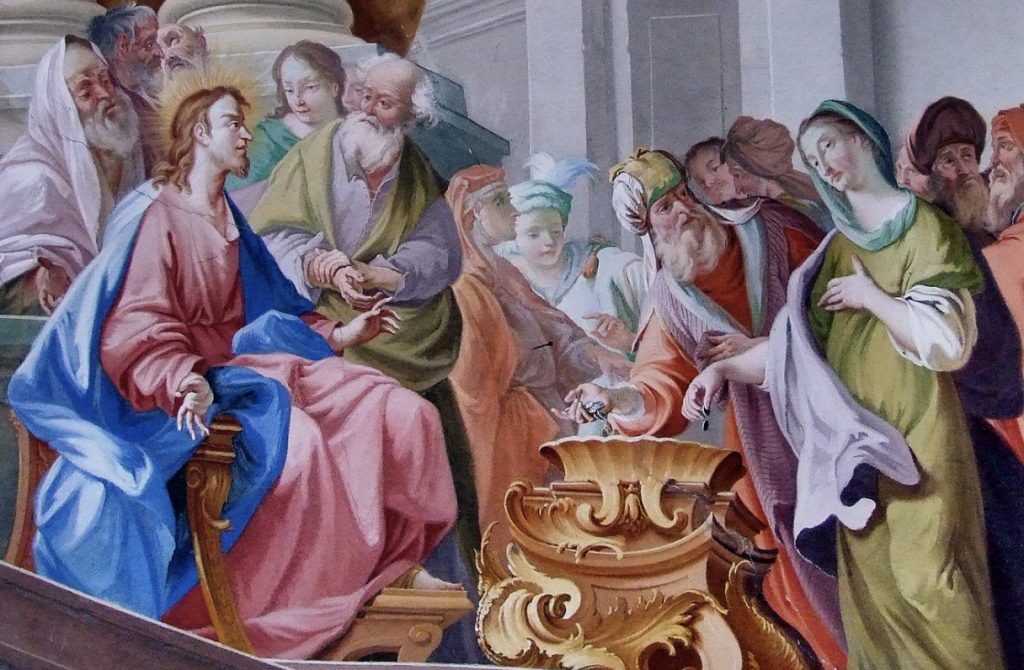Recently, a friend recommended the podcast “New Polity.” A 30-episode series called “Good Money” sounded especially relevant to Lenten almsgiving.
Marc Barnes and Jacob Imam, out of Steubenville, Ohio, are the hosts.
If you can set aside their juvenile potshots at libs, hippies, Democrats, and the West Coast, their lumping of all “rich people” into one perdition-bound category, and their obsession with Jeff Bezos, the series is packed with good, radical meat.
“Two Rules for Money,” the first episode for example, establishes that money is essentially for spending, not hoarding — a gospel concept that goes entirely against our “American,” holdover Puritan-work-ethic way of thrift, saving, and storing up.
Money is troublesome spiritually because it purports to be a safeguard against possible disaster. It’s a temptation to trust mammon instead of God. As well, culturally we tend to think of our money in terms of systems. There’s little focus on personal virtues.
Thus, the first rule is that it’s OK to save, say, for a house or a child’s college education. But money should be a placeholder. What is our money holding a place for?
The second rule is that the thing, project, or plan that money is holding a place for should shine through in our lives.
In Episode Two, “A Third Rule for Spending & Beneficence,” we learn that St. Thomas Aquinas enumerated five virtues to be cultivated around money: beneficence, liberality, magnificence, almsgiving, and temperance.
Beneficence, by contrast, is a positive good whereby we bless others with what we have and do. How can we use money to buoy people up instead of waylaying or exploiting them?
Money is to be used for the sake of others. Hoarding is a form of dying early. What keeps money from being idolatrous is spending it. When we store value and sit on it, people suffer.
We invest money without really knowing what it’s doing. We tend to want to make good returns, not to build virtue. We want, say, Amazon to do well. We don’t really care what Amazon does.
Investment is fine but we should know what it’s for. Investment should be a real risk and a real love. Economy should be about our interactions with one another. How well are we loving our neighbors? A house is for filling with people, not with things.
The idea is to use our money in such a way that we become saints. Christ came to topple Caesar but not with violence. Christ calls us to topple the social order by re-forming our lives.
Episode 3, “Liberality,” explores the second of Aquinas’ virtues around money. Worry is the fundamental attitude of the person who builds up wealth as a way to accrue protection against the world.
The liberal woman, by contrast, can have only two mites, like the widow in the parable, but she gives well and frequently. True liberality imparts the disposition of a nobleman: shoulders back, knowing we’ll be taken care of.
Episode 4, “Magnificence,” reflects upon another power of the soul that, if perfected and used, would create a just society.
This virtue is designed for the rich person, and consists in the capacity to dedicate an extraordinary sum to a great work: for example, raising a cathedral, founding a monastery, or beautifying an entire city.
Other episodes include “How To Spend $1 Billion,” “How to Teach A Man To Fish,” “Almsgiving,” “Why Money Is A Quasi-Sacrament,” “The Evils Of Interest,” “Is It Okay To Be Rich?”, “Money And Magic,” “Breaking Up With Your 401k,” “Insurance,” “Is Bitcoin a Good Coin,” and “Money Against Christian Community.”
The upshot: We need to become holy with our money and not depend upon our systems — banks, corporations, governments — to do that for us and to us. And if we’re going to err, let’s err on the side of wastefulness. The prodigal son is still not nearly as bad as Scrooge.
Somehow this all put me in mind of the late, great comedian Jackie Gleason, who was raised Catholic, fatherless, and dirt poor in Brooklyn.
Extravagantly generous as an adult, no matter how much he earned, he tended to live beyond his means. He threw doormen and bartenders 100-buck tips, rented whole railroad cars with open bars, jazz bands, and blondes to ferry his “pals” from Manhattan to Florida, and stood drinks at the bar with his last dollar.
And racked by guilt, his biggest worry was that he wouldn’t go to heaven.
The Puritan would say Gleason should have been thriftier. But Christ was no champion of thrift for thrift’s sake. To the man who stored up his assets in a barn, the Father said, “You fool, this night your life will be demanded of you; and the things you have prepared, to whom will they belong?” (Luke 20:12).
So this Lent, we might ask ourselves: How do I live and move and have my being in the world — not just around money, but in general?
Am I a sign of stinginess — or a sign of generosity?

